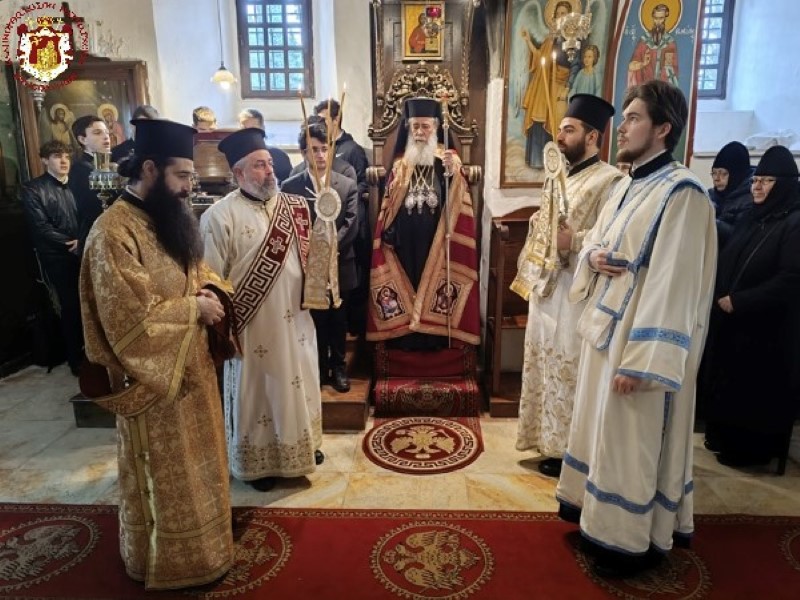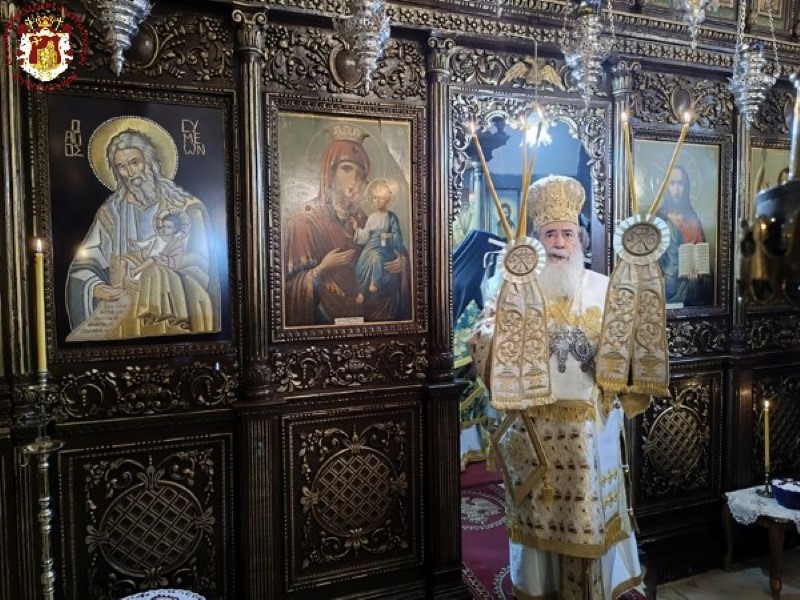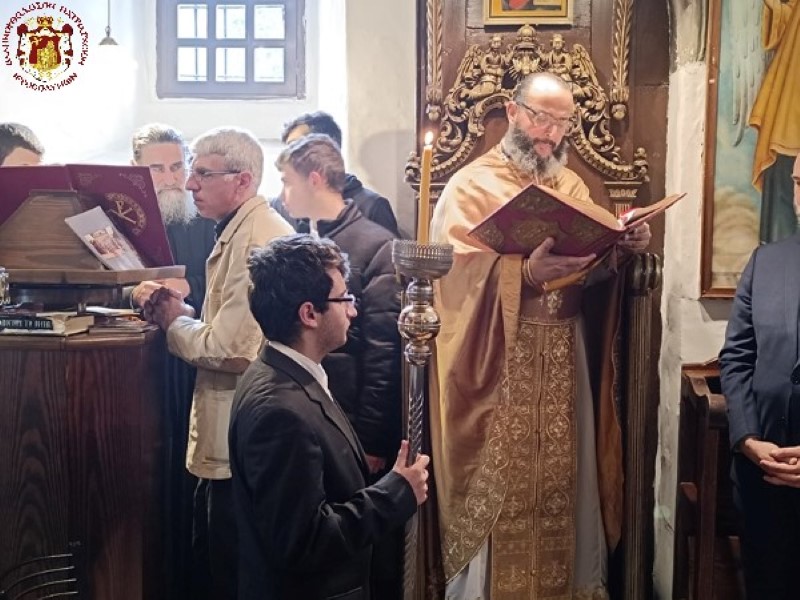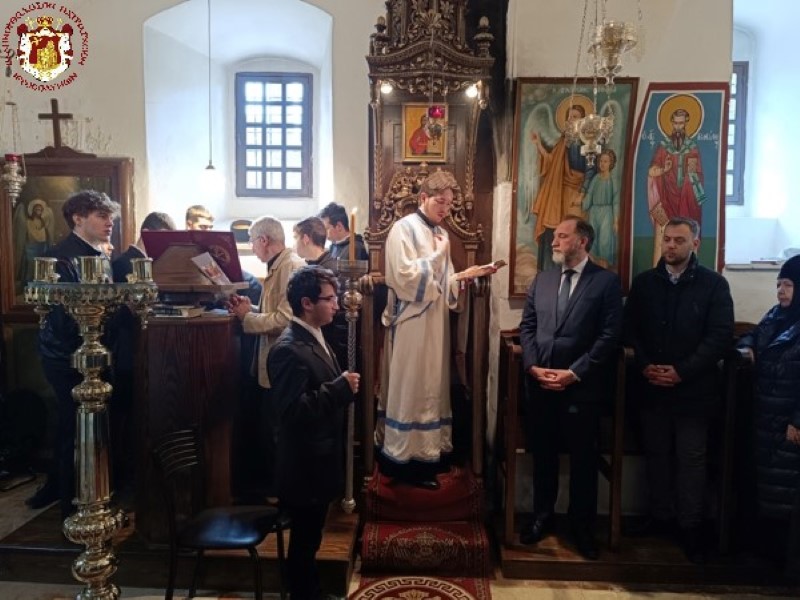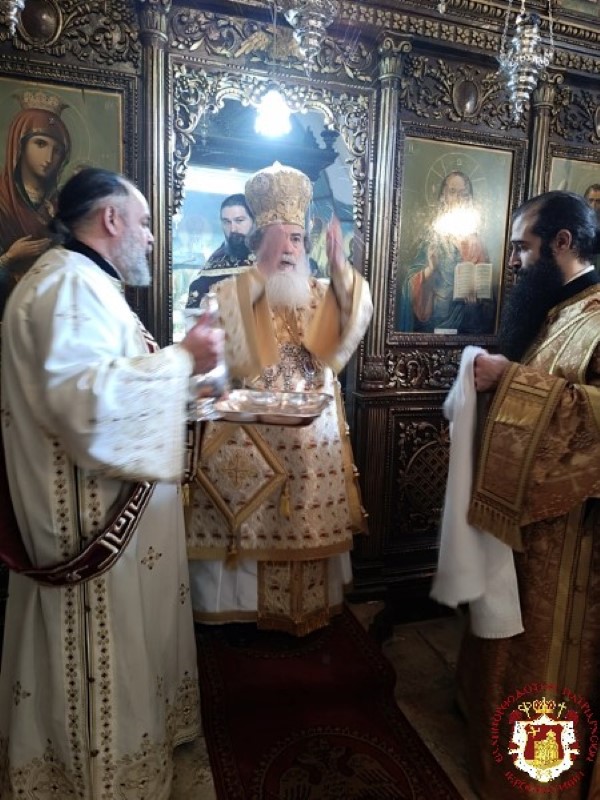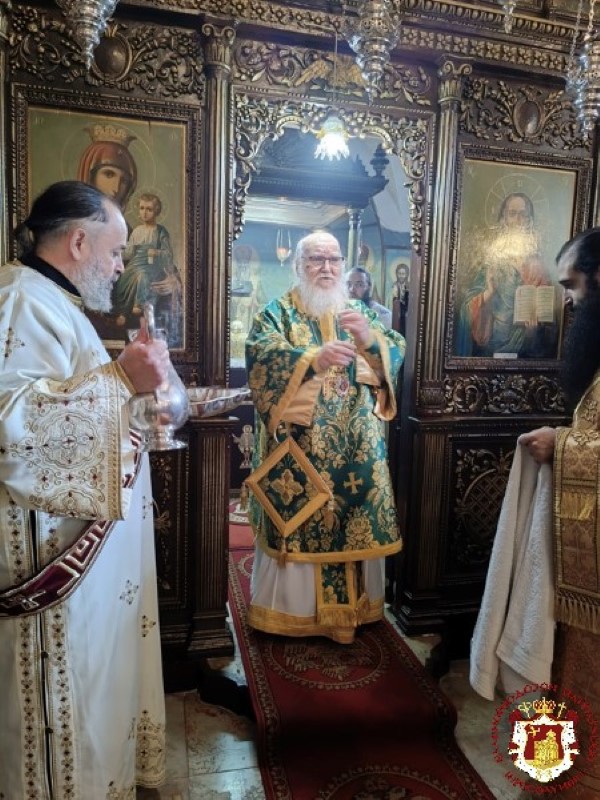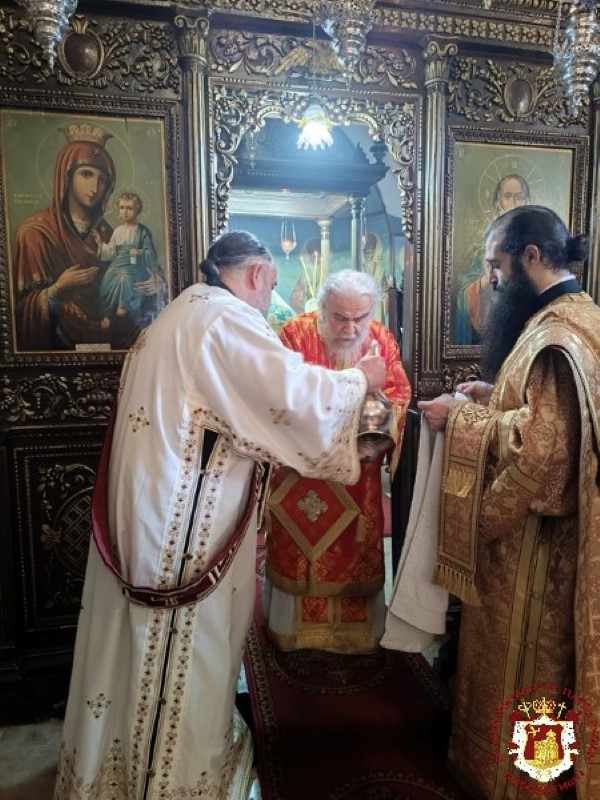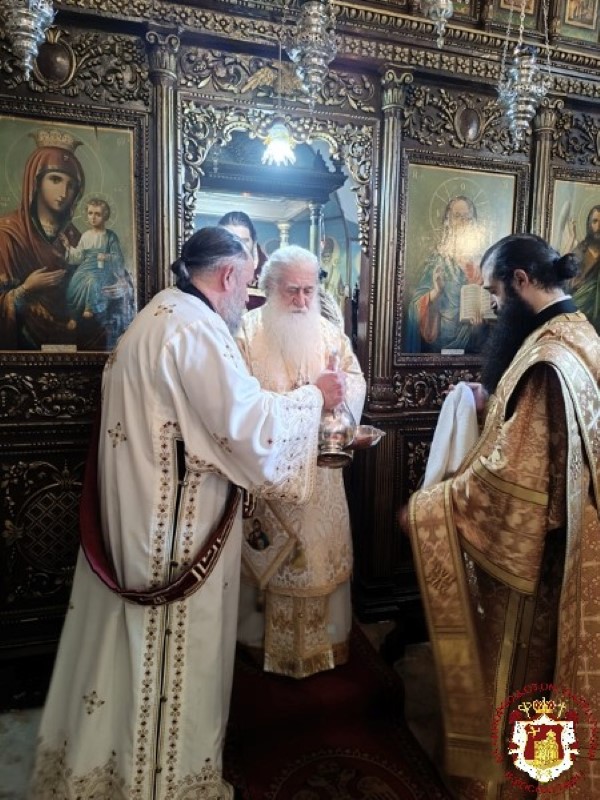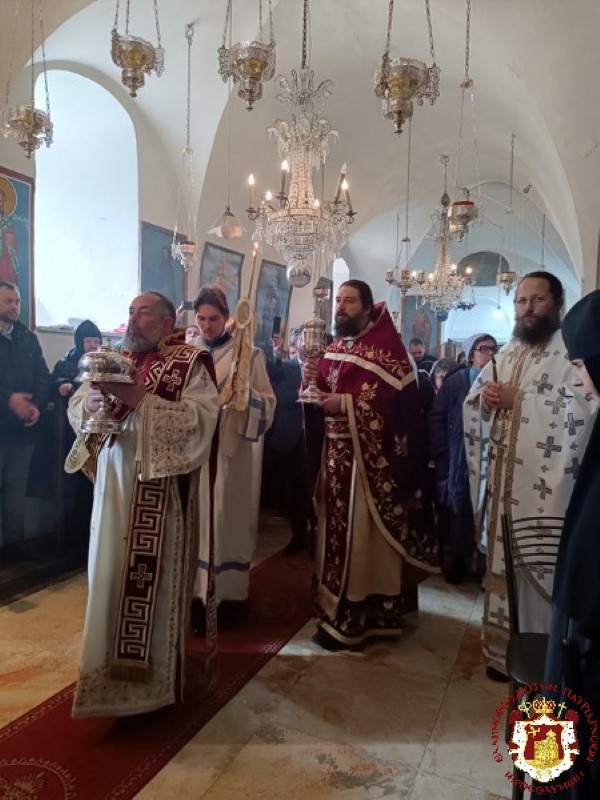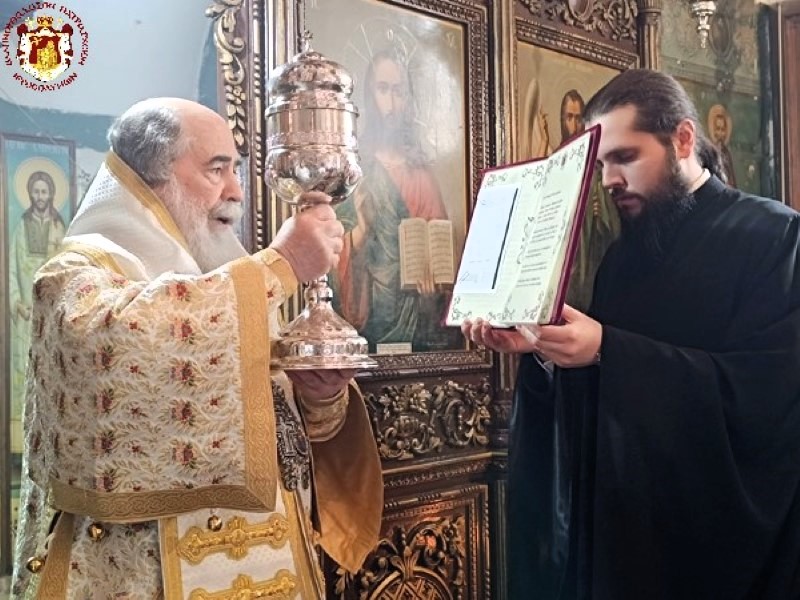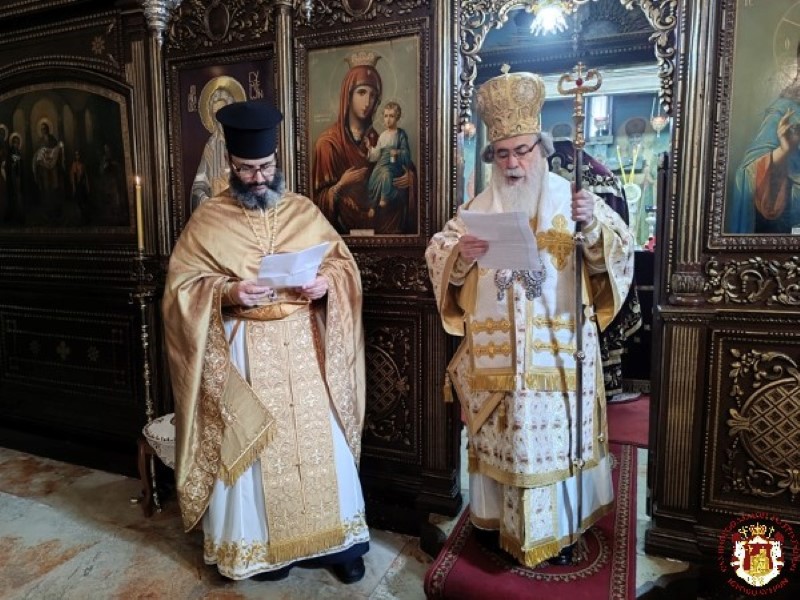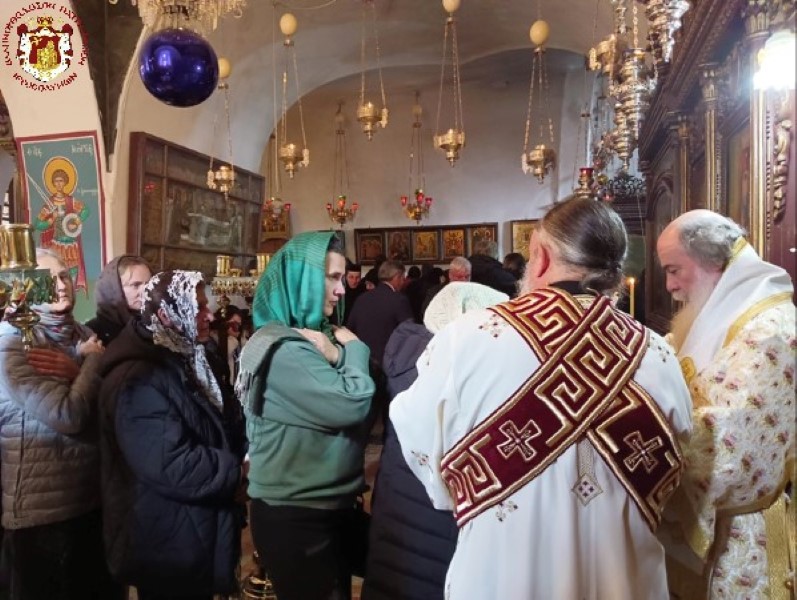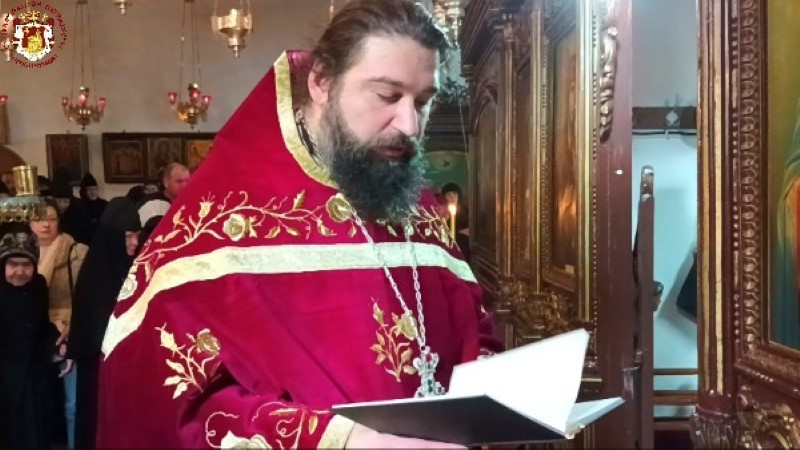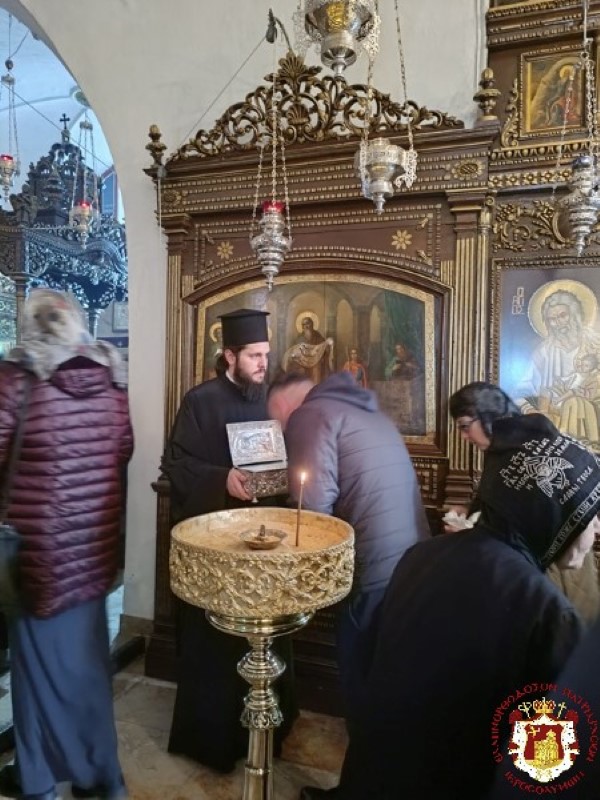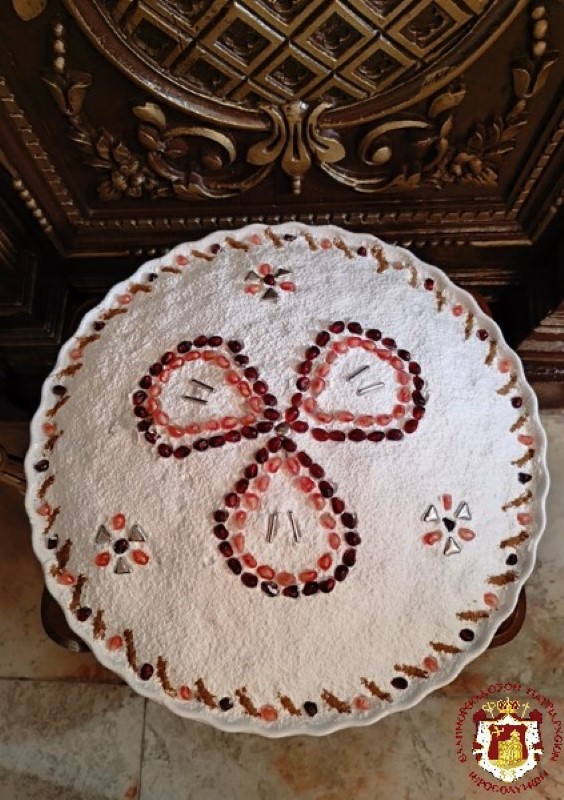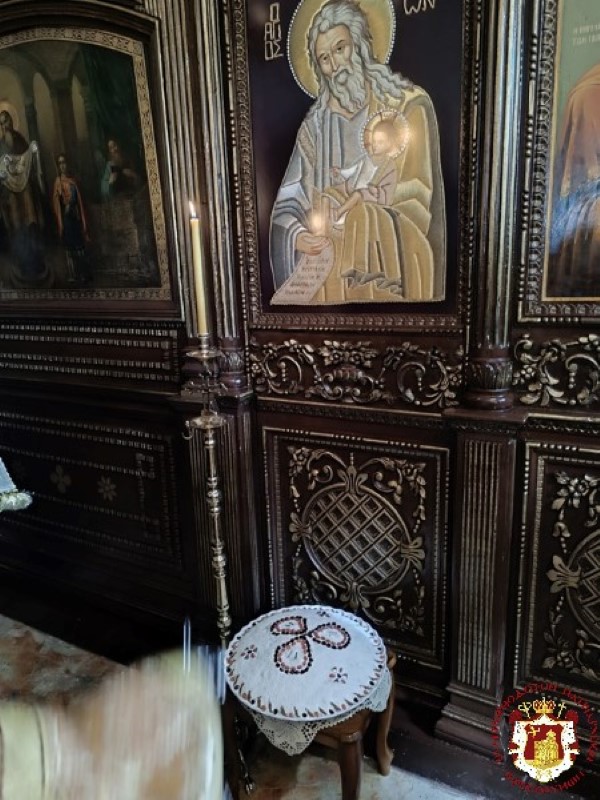The Feast of Saint Simeon the God-Receiver at the Patriarchate of Jerusalem
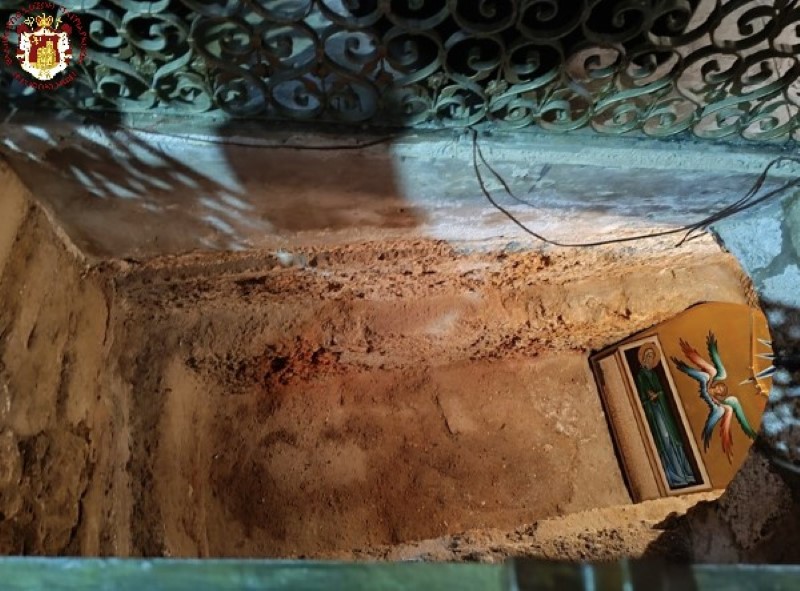

On Friday, February 3rd/16th 2024, the Patriarchate celebrated the feast of the commemoration of Saint Simeon the God-receiver in his Holy Monastery in West Jerusalem near the Monastery of the Holy Cross.
On this feast day, the Church honours Saint Simeon the God-receiver, as he especially ministered in the mystery of the Meeting of Jesus in the Temple, when he recognised Him as the Saviour and exclaimed: “mine eyes have seen thy salvation, Which thou hast prepared before the face of all people; A light to lighten the Gentiles, And the glory of thy people Israel” and asked to depart from this world: ” now lettest thou thy servant depart in peace, according to thy word”, (Lk. 2, 29-32).
For this feast, His Beatitude Patriarch Theophilos of Jerusalem presided over the Divine Liturgy in the above Church, with concelebrants their Eminences, Metropolitan Kyriakos of Nazareth, the Archbishops Aristarchos of Constantina, and Methodios of Tabor, Holy Sepulchre Hieromonks, with first in rank the Elder Dragoman Archimandrite Mattheos, the Archimandrites Claudius and Ieronymos, Vassian of the Russian Spiritual Mission to Jerusalem (MISSIA), Priest Simeon, Archdeacon Mark and Hierodeacons Eulogios, Dositheos and others. The chanting was delivered by Fr Hanna Awad-Antoniou, the Patriarchal School Students and Mr. Fadi Abed Al Nour, in the presence of the Consul General of Greece in Jerusalem Mr. Dimitrios Angelosopoulos and the prayerful participation of monks, nuns and members of the Greek Parish.
Before the distribution of Holy Communion His Beatitude delivered the following Sermon:
“Lord, now lettest thou thy servant depart in peace, according to thy word: For mine eyes have seen thy salvation, Which thou hast prepared before the face of all people; A light to lighten the Gentiles, and the glory of thy people Israel” (Luke 2,29-32), the Elder Simeon exclaimed.
Beloved Brethren in Christ,
Reverend Christians and pilgrims
The Holy Spirit, Who was with the righteous and pious Simeon has gathered us all today in this holy place where the Saint’s tomb lies, to honour his sacred commemoration in joy, and to celebrate the Meeting of the baby Jesus and our Lord and God and Saviour Christ in the Temple.
The Elder Simeon is distinguished among the rest of the holy prophets and people of the Holy Bible because he was deemed worthy to receive in his arms the “salvation of God”, namely Christ, that is why he says: ““Lord, now lettest thou thy servant depart in peace, according to thy word: For mine eyes have seen thy salvation, Which thou hast prepared before the face of all people; A light to lighten the Gentiles, and the glory of thy people Israel” (Luke 2,29-32).
Interpreting these words, among the established Fathers of the Church, Saint Cyril of Alexandria says: “It was prepared for Christ even before the beginning of the world, and it was revealed in the end of times”. Zigavinos says: “You (God) has provided the salvation before all, so that it may be visible to all”. Origen marks the wholistic nature of the salvation, saying: “This which they saw is the salvation not only for the Jews but for the whole world…before the face not only for one nation, not only for Israel but before the face of all the peoples”.
Indeed, “the salvation of God”, whom the righteous Simeon’s eyes saw, refers to the wholeness of the salvation of the human race. And this is so, because “the salvation of God” is no other than the mystery of the Divine Providence, namely the Incarnation of God the Word, as the God-bearing Church Fathers explain. “He called salvation the Incarnation of the Only Begotten Son”, Saint Theophylaktos says. “Salvation does the Bible call the Christ of God”, Saint Basil the Great says. And according to Saint Athanasios the Great, “salvation means the incarnate presence of God the Word”.
Moreover, the prophetic words of the pious Simeon, “A light to lighten the Gentiles, and the glory of thy people Israel” (Luke 2,32) testify that the Incarnate God the Word, through the pure flesh of the Ever-Virgin and Theotokos Mary is the presence of the divine light in the world of ignorance and idolatry. That is why the psalmist proclaims: “In Thy light shall we see light” (Ps. 36,10). The Lord clearly says in His preaching, “I am the light of the world: he that followeth me shall not walk in darkness, but shall have the light of life” (John 8,12). “Christ is the light of the nations because He was bound to enlighten with His teaching the nations that lay in darkness”, Origen says. “He became light to those who were in darkness and deluded, and had fallen into the devil’s hand”, Saint Cyril of Alexandria says. “Being a light to light the Gentiles and those blinded by fallacies; he calls revelation the ability to see again clearly; to the glory and prosperity of Your people Israel. Glory to them was the sprouting from them according to the human nature. Indeed, His redeeming incarnation enlightened the nations with the knowledge of God and virtue, while it glorified the Jews because He became a native to them (PG 129,893A), Zigavinos says.
Moved by the Holy Spirit, the Elder Simeon told Mariam, the mother of Jesus, “Behold, this child is set for the fall and rising again of many in Israel; and for a sign which shall be spoken against” (Luke 2,34). Interpreting this word, Saint Cyril of Alexandria says: “Emanuel is laid by God the Father a chief cornerstone, elect, precious (c.f. 1 Peter, 2,6). But those who believed in Him were not put to shame; whereas the unbelievers who did not manage to see this mystery in Christ, fell and were crushed. God the Father said again: “Behold, I lay in Sion a stumbling stone and rock of offence: and whosoever believeth on him shall not be ashamed” (Romans 9,33, PG 72,505B).
Indeed, my dear brethren, since Christ, the Son and Word of God the Father came into the history of man, He became the reason for the fall and the rise of many; fall to those who did not believe in Him, and rise for those who accepted and believed in Him. That is why up to this day Christ remains “a sign which shall be spoken against” (Luke 2,34). That is what Saint Paul also means when he says, “Notwithstanding, every way, whether in pretence or in truth, Christ is preached” (Phil. 1,18). According to Saint John the Evangelist, this precisely “is the condemnation, that light is come into the world, and men loved darkness rather than light because their deeds were evil” (John 3,19).
To our question, what is that which prevents people from seeing the light of truth, namely Christ? The answer is, two things; on the one hand, it is the free will of man, and on the other, man’s evil deeds. For this the God-inspired Apostle Peter says: “Who his own self bare our sins in his own body on the tree, that we, being dead to sins, should live unto righteousness” (1 Peter 2,24). This means that no one can rely on Christ as the Saviour unless he has abandoned sin and lives with “righteousness”.
The way to be free from sin is our encounter with Christ according to the righteous Simeon’s example, who “received Christ in his arms” (c.f. Luke 2,28). Our Holy Church calls us to this cause through the hymnographer’s voice: “Come let us as well, with songs inspired by God, go together to meet Christ and let us receive Him Whose salvation Simeon hath now beheld” (Vespers, Sticharon 3). “Let us pay heed so that the Lord will not find us asleep”, Athanasios the Great says.
Our meeting, my dear brethren, with our Saviour Christ is always feasible within the Church, through prayer and the cultivation of the virtues of humility and repentance, especially through participation in the sacrament of the Eucharist, where the one who has a clear heart is vivified and deified on the one hand, and sees through the eyes of the soul the salvation of God, that is, Christ, on the other. Amen. Many peaceful returns!”
Before the Dismissal, His Beatitude blessed the boiled wheat (Koliva) and conducted a Trisagion on the completion of nine days since the falling asleep in the Lord of the blessed Hegoumen Archimandrite Theodoritos, who served for forty-five years with devotion to the Holy Monastery and this Greek Community.
After the Divine Liturgy, Hierodeacon Simeon and nun Maria, who devotedly served the departed father Theodoritos for many years, hosted a reception for the Patriarchal Entourage and the congregation.
From Secretariat-General
Source: Patriarchate of Jerusalem



